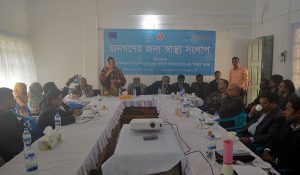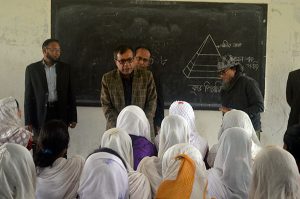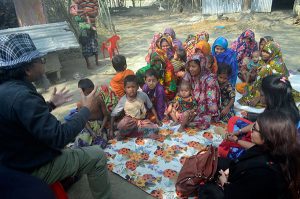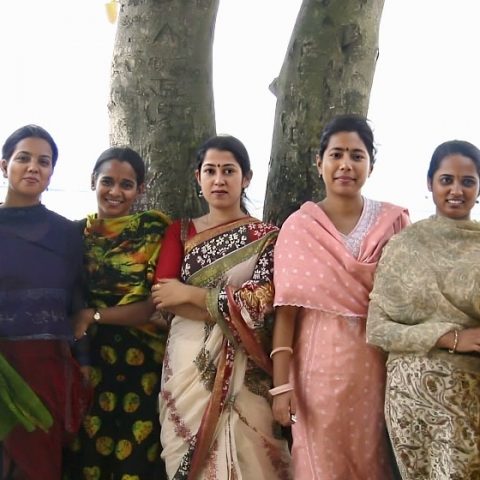In Bangladesh, healthcare workers are unevenly allocated in urban and rural areas for health service delivery, and it is worsening in hard-to-reach areas throughout the country. There is a crucial need for more healthcare providers and better medical facilities in these areas.
In order to address such disparities, health dialogues at the community level can be helpful to coordinate community-level health planning in rural settings that often suffer from a lack of basic resources. Such initiatives can empower local communities to take the lead to address their own health requirements by letting them connect beneficially with local health workers and doctors and describe their needs.

icddr,b researchers are working alongside the Government of Bangladesh to make sure that health-requirement and views of the general public are at the centre of discussions on health policy in this country.
As part of this initiative, a team of icddr,b researchers recently arranged a participatory health dialogue in Monpura upazilla – a remote island under Bhola District in the Barisal division in Bangladesh. The dialogue was organised as part of the European Union supported SHARE (Strengthening Health, Applying Research Evidence) project which aims at building capacity of evidence-informed health policymaking.
The project also strives to study and evaluate local community needs to improve healthcare facilities both in urban and rural settings. The “Health Dialogue for Citizens,” held at Monpura Upazila Health Complex in January 2018, involved local people, health service managers, stakeholders, government officials, elected representatives, social elites and local media. People from all occupations shared their views on the needs, expectations and existing situation around health service delivery in hard-to-reach areas.
Major recommendations
The dialogue in Monpura exposed a stark scarcity of doctors, nurses and basic medicines.
The initial challenges of Monpura Health Complex was lack of medical manpower, inadequate services in emergency obstetric care, cleanliness, security, lack of coordination between local administration and community leaders and inefficient documentation and reporting system.
The major recommendations emerging from the discussions were:
- Government of Bangladesh should take measures to imprive the service provide incentives for doctors posted in remote areas throughout the country.
- Dedicated doctors working in hard-to-reach areas should be given national recognition, which will end up boosting their motivation and inspire others.
- Training should be given to local caregivers on using medical technologies, such as, Ultra-sonogram, ECG and X-ray.
- For purchasing expensive medical instruments, a future collaboration with UNICEF would be financially beneficial.
- Usage of additional solar-powered instruments should be promoted since the locality lacks access to the national power grid.
- A diabetic card with information on non-communicable disease (NCD) awareness should be developed and distributed among the local population.
Learnings and way forward
This health dialogue event in Monpura was expected to create further awareness on health issues, a sense of ownership and accountability among the community caregivers and advance the learning agenda on health services from development partners, service providers and government representatives.
icddr,b researcher Dr Iqbal Anwar, also project director, SHARE, mentioned, “Through these dialogues, we can achieve a clearer perception of community participation in public health, which in turn will help us to adapt and modify medical service delivery according to local requirements. This will also help to create a sense of responsibility and shared ownership among community caregivers.

icddr,b team talking to schoolgirls about nutrition. Photo: icddr,b
“The researchers working with icddr,b and other similar organisations can also share and communicate their findings and outcomes among local people and get a better understanding of healthcare needs in hard-to-reach areas.”
Similar public engagement programmes will mutually benefit all parties involved in the healthcare system. By considering the observations of the local people on health issues, the SHARE project will help strengthen the understanding of the hurdles faced by the medical system in remote areas.
In continuation of similar public engagement event previously hosted by SHARE, a community support group for Monpura Upazila Health Complex was formed in 2016. The support group is led by the elected Upazilla chairman, working alongside members from the local administration and the local people.
The importance of community financing in improving healthcare was also highlighted when two sizeable donations worth of BDT 1,00,000 were handed over to the chairman of Monpura Upazila Health Complex to improve the existing health facilities. The chairman of Dhokkhin Shako Porishod, Monpura, also promised a sanction of a further BDT 15,00,00 for the development of the health complex.
The attendees applauded these initiatives. The attendee journalists also promised to write and report on this issue, so more community financing could be arranged in the months ahead.

icddr,b team speaking to local people. Photo: icddr,b
In conclusion, this health dialogue will permit people to reveal their communal power and start productive discussions and sharing of knowledge between healthcare providers, representatives of the Government of Bangladesh and local population. For researchers, such discussions help create a platform to learn, perceive and evaluate study findings regarding community based healthcare facilities.
This event will further strengthen the platform for the local communities, doctors, nurses, policy makers, researchers and relevant stakeholders in Monpura to share their opinions towards a more robust health service delivery model in their localities and other rural settings and develop a successful health management system.
Among the attendees of the event were Dr Mahbubur Rahman, director (health), Barisal division; Ms Shelina Akhter Chowdhury, chairman, Monpura upazilla; Dr Iqbal Anwar, project director, SHARE; and Dr Selim Reza, professor, Shaheed Suhrawardy Medical College; Dr Abdul Majid, deputy programme manager, maternal health, DGHS; Dr Mushtuq Ahmed, consultant, icddr,b; Mr Shishir Morol, special correspondent, Prothom Alo.

